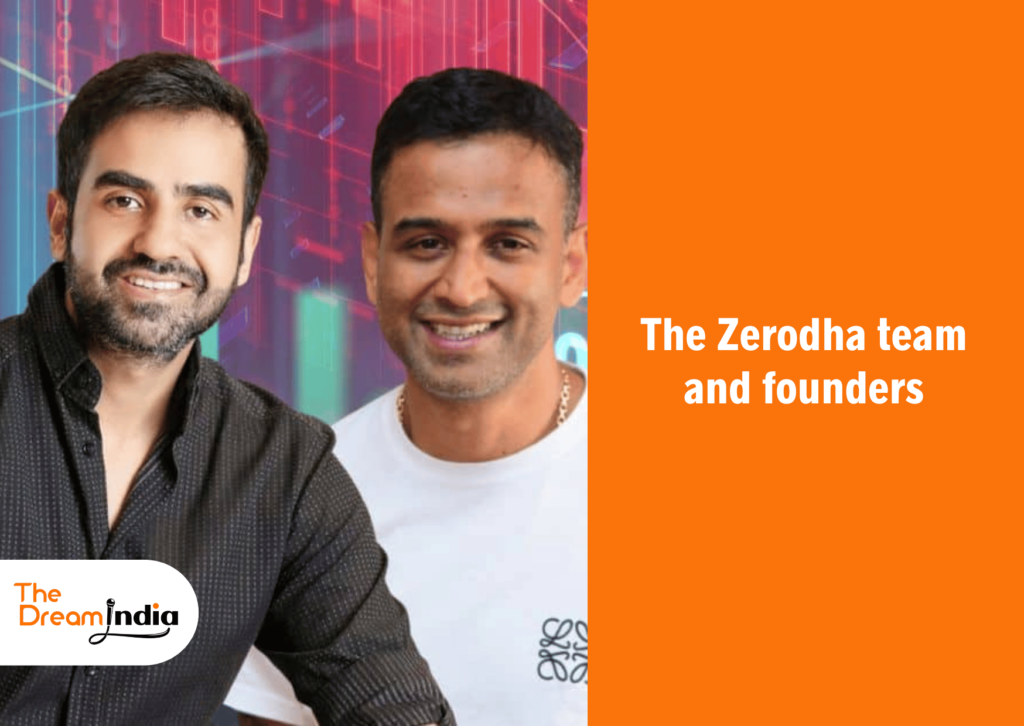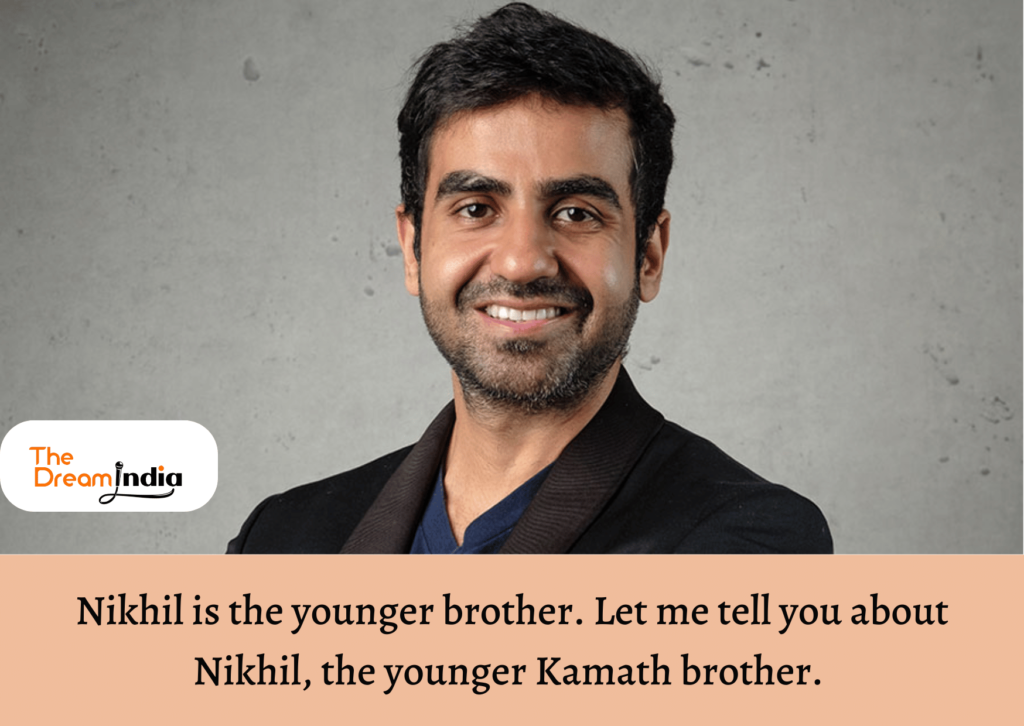
The stock market has been growing very fast since the 2000s. Since 2010 Zerodha has been doing this; the company was founded by Nithin and Nikhil Kamath, two brothers.
The city where Zerodha is located is Bangalore, and it is a company specializing in helping people trade securities.
Zerodha, functioning with leading Indian stock exchanges, is championed by the government.
Zerodha does its business online. It tries to make trading cheaper for its customers.
This holds significance because it increases long-term profits for traders who deal with buying and selling shares.
What is Zerodha and how does it work?
Zerodha works differently from other stock trading companies. They charge very little money when people buy or sell stocks. This makes more people want to use Zerodha.
This is why Zerodha is popular, with 6.3 million active users today.
The initial company to offer inexpensive trading in India was Zerodha.
Trading should be simple for everyone, he moved Zerodha, a firm he began, and wanted trading to be uncomplicated according to Nithin Kamath.
The name they gave that company was Zerodha, which translates to “no obstructions”.
One of the reasons for Zerodha’s growth is the effort they put in coupled with an unceasing generation of fresh ideas.
Their constant aim is to better the customer’s experiences. This helps them beat all other companies in a similar line of business.
The Zerodha team and founders

The founders of Zerodha are two brothers Nithin Kamath and Nikhil Kamath.
Nithin Kamath
Nithin is the older brother. He’s the boss (CEO) of Zerodha. He also started a charity to help the environment. Nithin studied at the Bangalore Institute of Technology.
After college, Nithin first worked on his own, buying and selling stocks. Then he worked at a company called Manipal Infocom, talking to customers on the phone.
Later, he worked with his family in their business. Finally, Nithin and his younger brother Nikhil started Zerodha together.
Nikhil Kamath
Nikhil is the younger brother. Let me tell you about Nikhil, the younger Kamath brother.

He’s quite a character! Nikhil is not just a Co-Founder at Zerodha but he has started another company called True Beacon which works for the super-rich as a wealth manager.
Can you believe that Nikhil never even finished high school? Having only sixteen years, he ceased his education after finishing high school. This information, however, shouldn’t fool you because he has always been a businessman at heart.
Nikhil didn’t stop there. He started managing money for his friends and coworkers. This was his first taste of asset management, and he loved it.
Eventually, Nikhil said goodbye to the call center and teamed up with his brother. They dove into automated trading and, before you know it, they founded Zerodha together.
The StartUp Story of Zerodha
Nithin, who is one of Zerodha’s founders, was only 17 when he made the decision to begin trading in the stock market. To support his trading habit, Nithin took a night job at a call center.
Nithin’s early days in the stock market were a mix of ups and downs. He made some money from trading. In 2001-02, the stock market crashed.
Nithin lost much of the money he had made. Though it was tough, this was not the end for him.
After this setback, Nithin’s luck started to change. A wealthy person from another country noticed Nithin’s skills and asked him to manage his money. This was a big opportunity for Nithin. Around the same time, he also got a job at a company called Reliance Money. Here, he helped other people buy and sell stocks.
At Reliance Money, Nithin really shined. He was incredibly good at his job, bringing in many important clients. In fact, he did better than a thousand other people doing the same job. This success showed that Nithin had a special talent for understanding the stock market.
Instead of giving up, Nithin saw an opportunity.
He realized that many people found it difficult and expensive to trade stocks.
He thought of an idea that would develop a business that simplifies and cuts the costs of stock trading to be accessible to everyone. He aimed to establish a web-based system enabling every person who wishes to buy or sell shares to do so with ease.
This idea was the seed that grew into Zerodha. Nithin’s experiences – both good and bad – in the stock market helped him understand what traders needed. He used this knowledge to create a company that would change how people in India traded stocks.
The launch of Zerodha as a startup

When Nikhil and Nithin started Zerodha, it didn’t become popular right away. It took many years for people to know and trust their company.
Zerodha saw that only 3,000 individuals opened accounts in its first year.
In India, if something is inexpensive, most individuals would attribute it to poor quality.
This was a big challenge for Zerodha to overcome.
To solve this problem, Zerodha did something smart. They built a community of traders who used their service. This community helped Zerodha grow over time. Interestingly, even now, Zerodha doesn’t spend money on ads. They rely on their users to spread the word.
Building this community was really important for Zerodha. At first, many traders were unsure about Zerodha because it was so cheap. They thought Zerodha might not offer help with choosing which stocks to buy or sell. To fix this, Zerodha created something called Varsity. Varsity is like an online school that teaches people about trading. It became very popular.
Zerodha also made a place called Trading Q&A. Here, traders could ask questions and share ideas about buying and selling stocks. This helped people learn from each other.
As time went on, Zerodha started using a lot of new technology. This made them different from other companies. They also created something called Coin, which is a website where people can buy mutual funds directly without going through someone else.
By doing all these things, Zerodha slowly gained more users and became a trusted name in stock trading in India.
An overview of Zerodha’s business model
Zerodha makes money in a simple way. They charge very little for each trade, but they have many customers who make lots of trades. This is called a ‘low margin and high volume model.’
Here’s how it works:
- Zerodha charges only a small fee when someone buys or sells stocks.
- Because the fee is so low, many people choose to use Zerodha.
- Lots of people making lots of trades means Zerodha still makes good money, even though each fee is small.
Another reason Zerodha makes good profits is that it doesn’t cost them much to run their business. This is because everything is done online. They don’t need many offices or lots of people to work in them. This keeps their costs low compared to other stock trading companies.
Recently, Zerodha got some good news. The main government office that watches over stock trading in India (called SEBI) said Zerodha can now offer mutual funds too. Zerodha had asked for permission to do this in February 2021.
This new permission means Zerodha can start its own company to manage mutual funds. This is a big step forward for Zerodha and will help them offer even more services to their customers.
The Future of the Company
As a result of the COVID-19 pandemic, more people have taken up retail investment, thus boosting Zerodha’s advancement even majorly.
Nevertheless, it also resulted in regulators scrutinizing more closely and in increased competition from well-funded fintech startups.
Nithin, together with his colleagues, vowed to strictly adhere to their main beliefs that included openness, the use of advanced tools as well as putting interest of customers first.
They continued to come up with fresh ideas in which they would look at algorithmic trading for retail investors and financial planning tools.
Zerodha’s story is far from over, but its impact on India’s financial landscape is undeniable.
Zerodha has shown that strong vision and performance can bring about upheavals in very established trades ranging from small startup challenging the status quo to becoming a market leader.
According to Nithin Kamath, “We’ve just begun.” Since many Indians are yet to join the investing class, Zerodha’s plan to bring financial inclusion to India remains intact; hence, it’s a promising time for both the organization and her entire financial market landscape.





